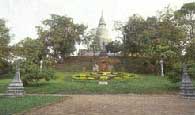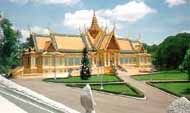 |
|
 |
Phnom Penh & Environs
The magic of the Angkor
temples and the many prasats around the country can easily overshadow
all else. But given a closer look, Phnom Penh has so much to offer
visitors.
Truly a cosmopolitan
city right where four rivers converge, Phnom Penh shows off a mix of
French as well as Chinese influence with distinctively Khmer
characteristics. Restored French colonial homes, grand boulevards lined
with giant trees, Chinese merchant house a long the river banks are
reminiscent of a time gone by.
Must-sees in Phnom Penh
are the Royal
Palace and its Silver pagoda, the
National Museum, Wat Phnom, the Independence
Monument, Tuol
Sleng Genocide
Museum and the Killing Fields, just outside the capital.
For those who love
shopping, there are several markets that offer handicraft, silk, silver
ware, wood carving, precious stones from the country's famous mines, as
well as antique furniture and paintings by local artists.
NATIONAL
MUSEUM
|
Located just north of the
Royal
Palace, the National Museum was recently restored to its former
glory as one of the finest examples of Khmer architecture. On
display are more than 5,000 artifacts and objects d'art from the 6th
to the 13th centuries. |
 |
|
They
include sandstone sculptures, royal barges, palanquins and silk,
intricately woven with silver and gold threads. There are also rare
religious objects in gold, silver and bronze. The museum's central
courtyard with its lotus ponds enjoys the cool shade from palm trees
and is a perfect place for visitor to rest peacefully and
contemplate the magnificence of Khmer art and history. |
INDEPENDENCE MONUMENT
|
 |
The
Independence Monument commemorates the 1953 end of French rule over
Cambodia.
Designed by a Cambodian architect, the Naga (a mythical bird
symbolizing strength and benevolence) motif of the monument is a
symbol for the country's aspirations. |
|
The
Naga also adorns most important buildings in the country, including
the Olympic Stadium and the Chatomuk Hall, which marks the
convergence of four main river: the upper and lower Mekong, the
Tonle Sap and the Bassac rivers. |
WAT
PHNOM
|
Legend has it that
after a major flood a wealthy Khmer widower named Daun Penh found a
large tree on the bank of the
Tonle Sap with four ancient statues of
Buddha hidden inside. In 1434 she decided to erect a large hill and
build a temple to house sacred relics. |
 |
|
Today, Wat Phnom
remains the highest artificial hill in
Phnom Penh and the center of many form of religious
activities. |
ROYAL
PALACE
Built in 1866
by His Masjesty Preah Bat Norodom, the Royal Palace is now home to his Majesty Preah Bat
Norodom Shihanouk and Her majesty Preah Reach Akka-Mohesey Norodom .
|
 |
Most
of the buildings inside the palace are closed to the public, except
for special occasions. Recently, the Coronation Hall, where Their
Majesties received foreign dignitaries and high government
officials, was opened to the public to see its many treasures.
|
|
At
the entrance to the palace grounds is the open-air theatre where the
Royal Ballet perform for the Their Majesties and their guests. Also
within the palace walls is the Silver Pagoda, which draws its name
from the 5,000 silver tiles that pave its floor. Inside the pagoda
there are hundreds of gifts to Cambodian king, including a
solid-gold Buddha encrusted with 9,584 diamonds weighing 90
kilograms. |
|
|

